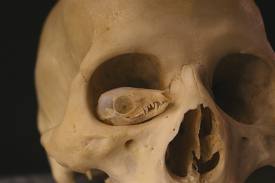Government Grants
Business Grants
Home Owner Programs
Federal Programs
About Us
Instrument Capacity for Biological Research
Advances in the biological sciences are enabled by our capacity to acquire, manage, represent, and analyze biological information through the use of modern instrumentation and computational tools.
Instrumentation Capacity for Biological Research (ICBR) invites proposals that specifically enable
increased access to state of the art instrumentation in support of the biological sciences by (1) increasing access to a community of users through broadening of dissemination of such instrumentation, and (2) broadening access to state-of-the art instrumentation and facilities at a regional or national level.
The “Rules of Life” is one of the NSF’s ten big ideas for future investment.
Understanding these basic “Rules” and how they operate across scales of time, space, and complexity to determine how genes function and interact with the environment will enable us to predict the phenotype, structure, function, and behavior of organisms.
Providing scientists with the instrumentation and resources necessary to make these discoveries requires investments in new instrumentation capabilities and extending access to existing instrumentation and experimental facilities.
Competitive proposals under ICBR will expand access to new or existing instrumentation that supports a significant segment of the biological research community conducting research in areas supported by the NSF Biological Sciences Directorate (BIO).
The program will support activities that (1) enhance the access to and dissemination of innovative instrumentation, and (2) promote and enable access to existing instrumentation facilities (ie.
imaging, genomics, proteomics, etc.) at the regional or national level.
ICBR supports capacity building that may include (but is not limited to):
Building a community of instrument users through broadening dissemination of new or significantly improved instrumentation Broadening of access to instrumentation or experimental facilities at the regional or national level that provide infrastructure for data collection that might not be otherwise available to researchers due to the cost of instrumentation, the lack of available resources on campus, or the requirement of otherwise unavailable technical expertise.
Instrumentation Capacity for Biological Research (ICBR) invites proposals that specifically enable
increased access to state of the art instrumentation in support of the biological sciences by (1) increasing access to a community of users through broadening of dissemination of such instrumentation, and (2) broadening access to state-of-the art instrumentation and facilities at a regional or national level.
The “Rules of Life” is one of the NSF’s ten big ideas for future investment.
Understanding these basic “Rules” and how they operate across scales of time, space, and complexity to determine how genes function and interact with the environment will enable us to predict the phenotype, structure, function, and behavior of organisms.
Providing scientists with the instrumentation and resources necessary to make these discoveries requires investments in new instrumentation capabilities and extending access to existing instrumentation and experimental facilities.
Competitive proposals under ICBR will expand access to new or existing instrumentation that supports a significant segment of the biological research community conducting research in areas supported by the NSF Biological Sciences Directorate (BIO).
The program will support activities that (1) enhance the access to and dissemination of innovative instrumentation, and (2) promote and enable access to existing instrumentation facilities (ie.
imaging, genomics, proteomics, etc.) at the regional or national level.
ICBR supports capacity building that may include (but is not limited to):
Building a community of instrument users through broadening dissemination of new or significantly improved instrumentation Broadening of access to instrumentation or experimental facilities at the regional or national level that provide infrastructure for data collection that might not be otherwise available to researchers due to the cost of instrumentation, the lack of available resources on campus, or the requirement of otherwise unavailable technical expertise.
Who's Eligible
Obtain Full Opportunity Text:
NSF Program Desccription PD-18-1108
Additional Information of Eligibility:
OJJDP invites applications from public agencies (including state agencies, units of local government, public universities and colleges, and federally-recognized Indian tribes) and private organizations (including faith-based, community, and tribal organizations.
OJJDP welcomes joint applications from two or more eligible applicants; however, one applicant must be clearly indicated as the primary applicant (for correspondence, award, and management purposes) and the others indicated as co-applicants.
Full Opportunity Web Address:
http://www.nsf.gov/funding/pgm_summ.jsp?pims_id=505542
Contact:
Agency Email Description:
If you have any problems linking to this funding announcement, please contact
Agency Email:
Date Posted:
2018-09-01
Application Due Date:
Archive Date:
2011-11-07
Social Entrepreneurship
Spotlight
Why People Buy from Social Enterprises?

The Guardian has compiled a list of responses to its latest open thread, and has announced the winner of the social enterprise gift hamper packed with presents.

